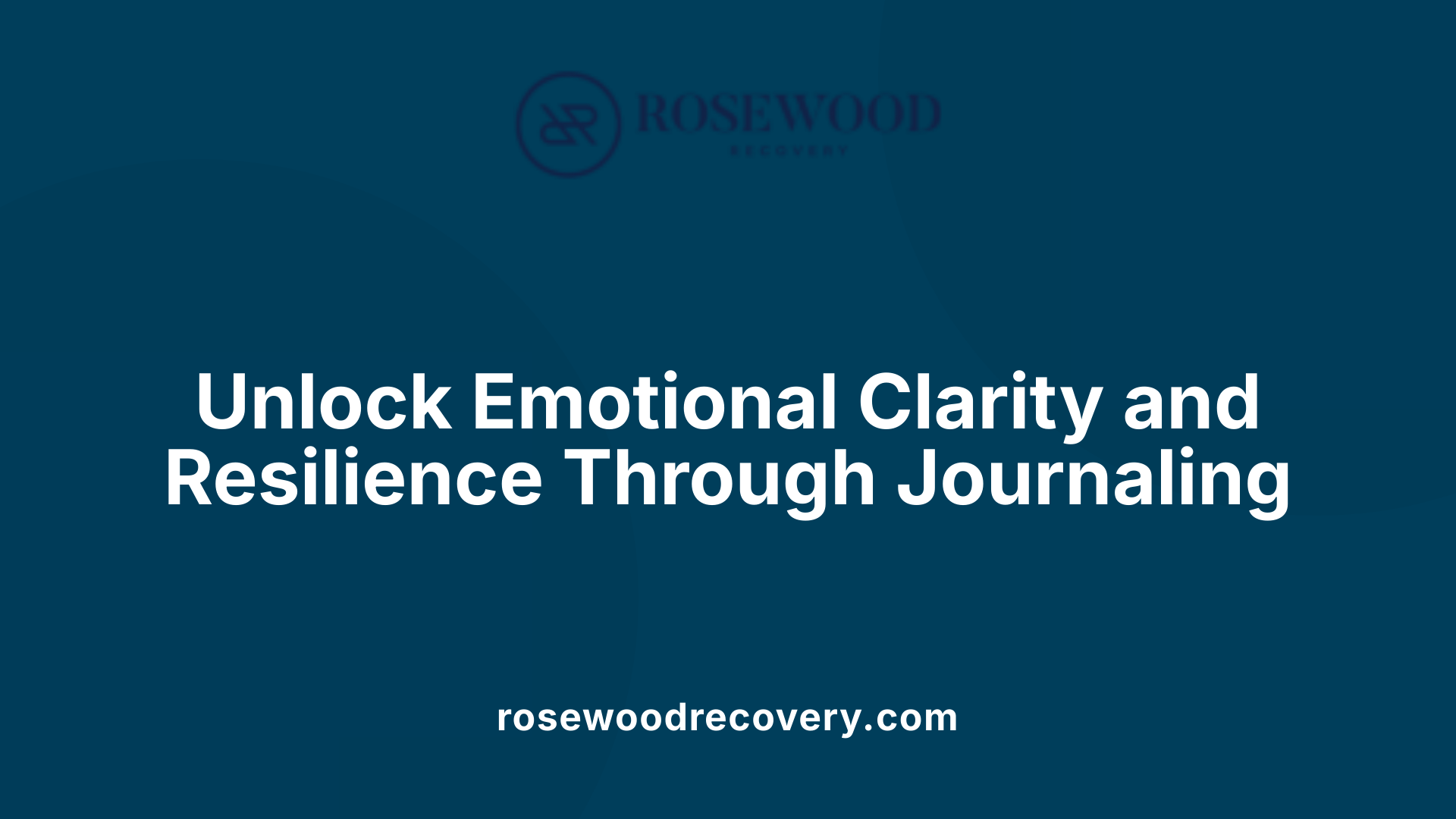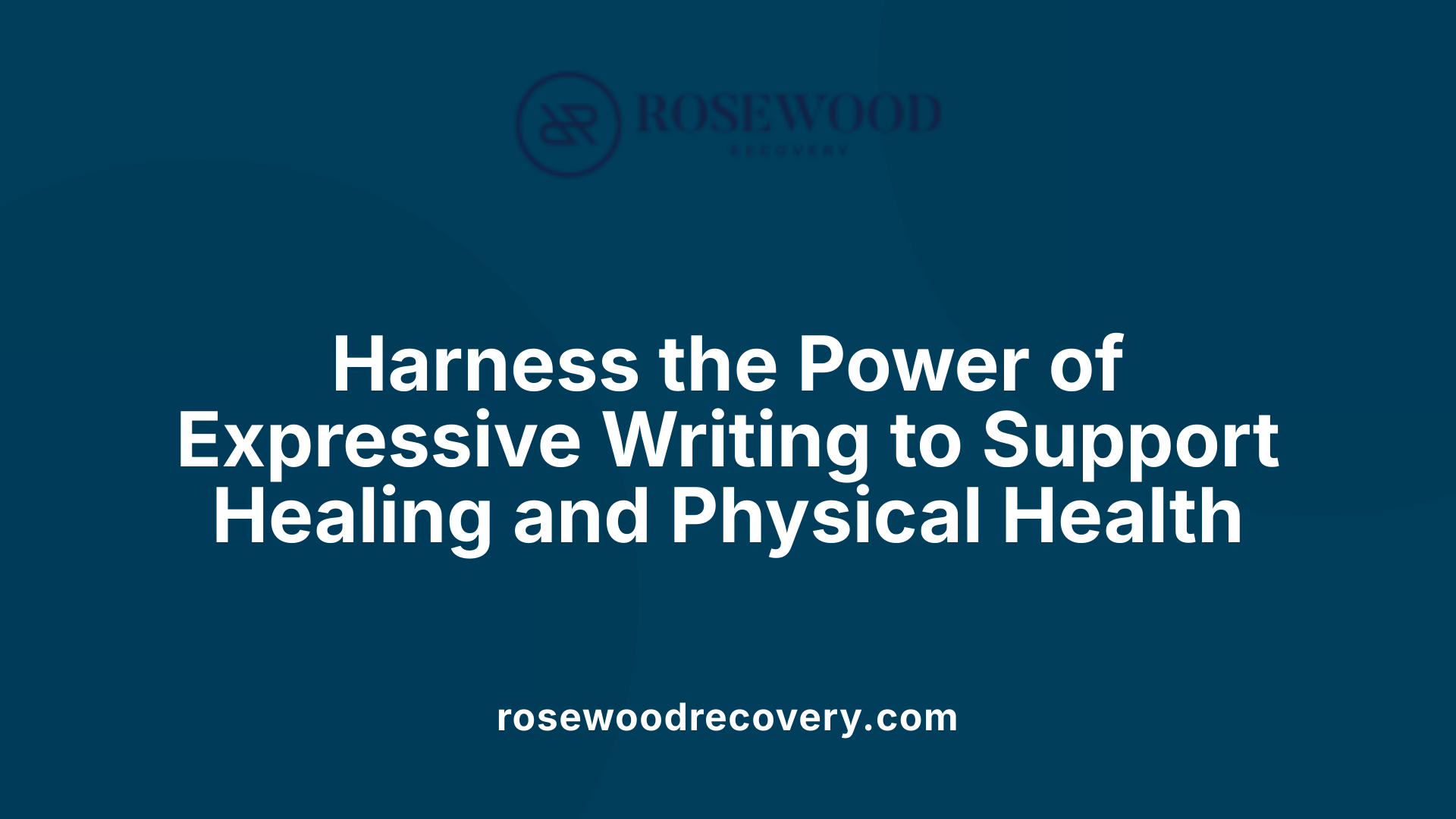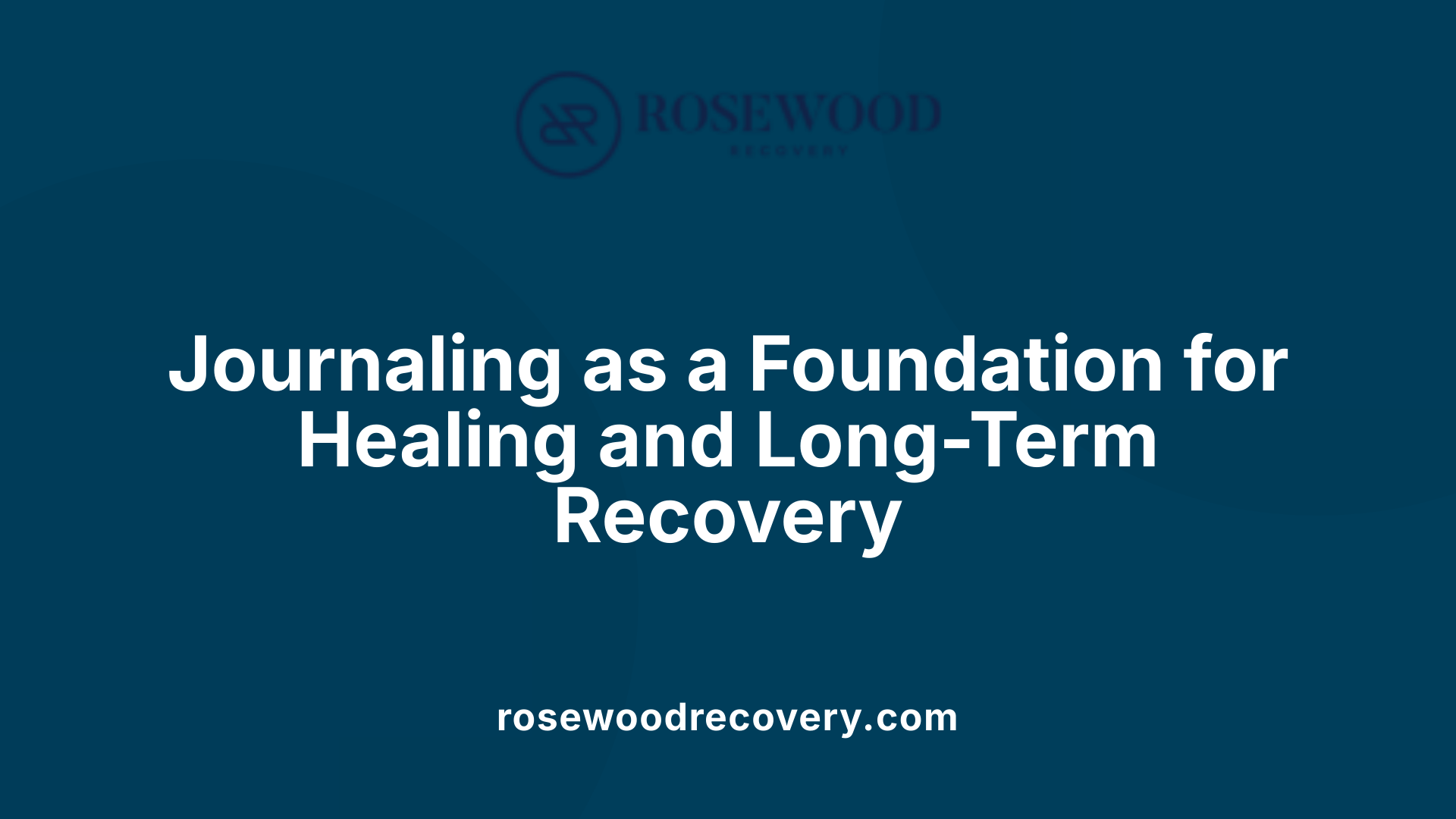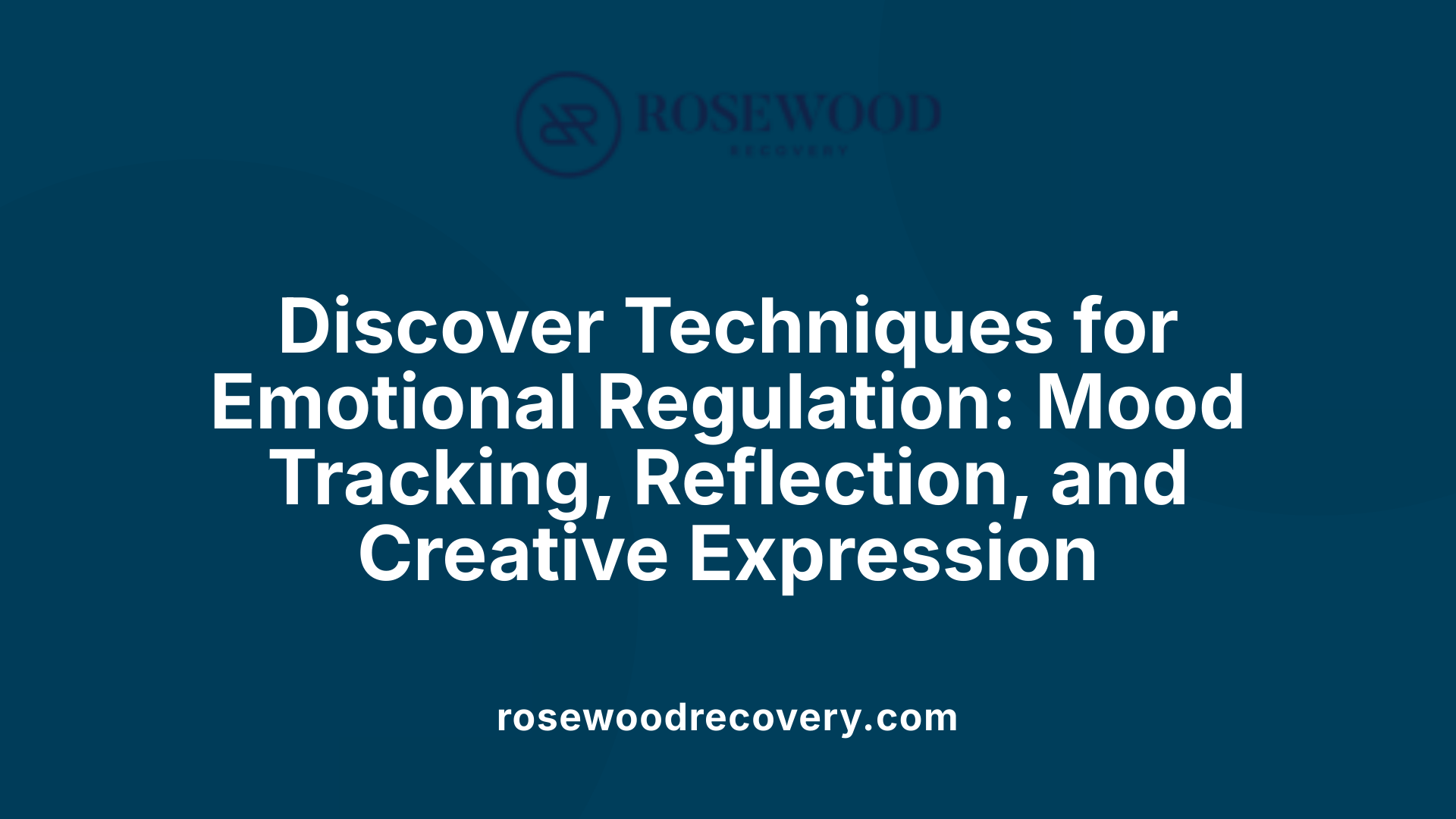The Transformative Role of Emotional Tracking Journals in Healing
In recent years, emotional tracking journals have emerged as a vital tool in mental health recovery, supporting individuals through their journeys of healing and self-discovery. These journals provide a safe, private space for self-expression, reflection, and emotional regulation. By harnessing various techniques and incorporating consistent practices, individuals can manage stress, anxiety, depression, and trauma more effectively. This comprehensive overview explores why emotional tracking journals are indispensable in supporting recovery, highlighting their benefits, practical techniques, and role in fostering resilience.
The Emotional Benefits of Journaling

What are the emotional benefits of journaling?
Journaling provides profound emotional support by creating a private, safe space where individuals can freely express their feelings and thoughts without fear of judgment. This open outlet helps clarify complex emotions, making it easier to understand what one is experiencing. For many, writing about their emotions reveals patterns and triggers that might otherwise go unnoticed, offering valuable insights into their mental health.
Expressive writing can function as a calming activity, reducing feelings of stress and anxiety. It allows users to process overwhelming emotions, facilitating emotional release and a sense of control over their inner experiences. This process can lead to greater self-awareness, helping individuals recognize their emotional needs and develop healthier coping strategies.
Journaling also builds emotional resilience by encouraging hope and optimism through reflection on personal growth and achievements. When combined with supportive methods like therapy or sharing with trusted loved ones, journaling can reinforce emotional strength, making recovery from mental health challenges more sustainable. In essence, it's an empowering tool that nurtures emotional well-being, balances feelings, and fosters a hopeful outlook for the future.
Supporting Healing and Recovery through Expressive Writing

How does journaling support healing and recovery?
Journaling is a powerful tool for emotional healing and mental health recovery. It provides a private space where individuals can process their stressful and painful experiences without judgment. This act of expressive writing allows them to make sense of complex emotions associated with traumatic memories, such as adverse childhood experiences (ACEs), injuries, or losses.
By writing about emotions related to trauma, individuals can better regulate their feelings and reduce emotional distress. Research highlights that expressive writing has tangible physical and psychological benefits, including decreased symptoms of immune dysfunction, lower blood pressure, and fewer visits to healthcare providers. These health improvements are linked to the process of confronting and understanding emotional pain within a safe writing environment.
Sharing journal entries or insights with supportive persons or therapists can deepen the healing process. Reflecting on written experiences helps individuals recognize patterns, triggers, and progress over time. This ongoing reflection fosters emotional resilience and provides a foundation for long-term recovery.
Overall, journaling nurtures emotional regulation, eases stress, and promotes physical health, making it an important component in the journey of healing from trauma and ongoing mental health challenges.
The Key Role of Journaling in Recovery Processes

Why is journaling important in recovery processes?
Journaling plays a vital role in recovery by offering a safe and private space where individuals can freely explore and articulate their emotions and thoughts. This process helps to reduce emotional distress and foster greater self-awareness. By writing about their experiences, people can identify negative patterns, recognize emotional triggers for relapse, and develop personalized coping strategies.
Moreover, regular journaling encourages self-discipline, helping individuals track their progress and celebrate milestones, which boosts motivation and resilience. It also aids in organizing thoughts, gaining emotional clarity, and alleviating stress, making recovery challenges seem more manageable. Overall, journaling supports emotional healing, enhances self-reflection, and underpins the development of healthier habits—all crucial for long-term recovery.
In addition, keeping a journal helps individuals set goals, monitor setbacks, and stay motivated throughout their journey. When paired with therapy or support groups, journaling can deepen insights and accelerate healing, making it an invaluable tool in overcoming addiction and mental health challenges.
Emotional Tracking as a Tool for Managing Mental Health
How does emotional tracking in journals assist in managing mental health conditions like stress, anxiety, depression, and trauma?
Emotional tracking through journaling is a valuable approach in managing mental health challenges such as stress, anxiety, depression, and trauma. By regularly recording feelings, thoughts, and experiences, individuals can begin to see patterns and triggers that influence their emotional states.
This consistent documentation helps develop greater self-awareness, allowing a person to understand what specific situations, behaviors, or internal thoughts are linked to their distress or mood shifts. When these patterns are identified, it becomes easier to implement targeted coping strategies, like relaxation exercises, behavioral changes, or seeking additional support.
Different journaling methods enhance this process. Mood journals help track everyday fluctuations, while expressive writing encourages emotional release and processing. Both methods can improve mood and lessen symptoms.
Overall, emotional tracking lays a strong foundation for proactive self-care. It empowers individuals to manage their mental health more effectively by recognizing early signs of distress and taking steps to address them before they escalate.
Techniques and Methods of Emotional Journaling

What techniques and methods of emotional journaling promote emotional regulation and progress?
Emotional journaling encompasses various strategies that help individuals understand and manage their feelings more effectively. Among these, mood tracking stands out as a popular technique. By recording daily emotions, external circumstances, and internal thoughts, individuals can identify patterns and triggers that influence their mental health. This practice not only fosters self-awareness but also helps in early intervention if negative patterns emerge.
Expressive writing and reflection are foundational methods in emotional journaling. Writing freely about thoughts and feelings allows a safe space to release pent-up emotions like guilt, shame, or anxiety. Reflection prompts—such as questions about personal growth, challenges faced, and coping strategies used—guide individuals to deeper understanding and insight. Over time, this process can lead to improved emotional resilience and clearer goal-setting.
Incorporating gratitude and visualization techniques enhances the benefits of journaling. Focusing on positive experiences and things one is grateful for shifts attention toward resilience and happiness. Visualization, such as creating mental images of successful coping or future goals, cultivates motivation and optimism.
Using prompts related to mood, gratitude, or personal achievements can add structure to journaling sessions. For example, a prompt might ask “What are three things I am grateful for today?” or “What emotions did I notice during a challenging situation?” These guides help individuals access their inner experiences more intentionally.
Consistent journaling with these varied methods encourages emotional regulation by providing clarity, supporting stress reduction, and fostering problem-solving skills. It aids in building a healthy emotional toolbox, essential for managing life's ups and downs.
Altogether, these techniques support a process of ongoing self-reflection, growth, and resilience—cornerstones of mental health and recovery. Regular practice not only tracks progress but also develops healthier patterns of thinking and behavior, especially when coupled with professional guidance and supportive coping strategies.
Journaling in Addiction and Trauma Recovery
Can journaling aid in addiction and trauma recovery?
Yes, journaling plays a vital role in the recovery process for individuals dealing with addiction and trauma. It provides a private and safe space to express complex emotions, helping to uncover underlying triggers and patterns associated with difficult behaviors or emotional distress.
Expressive journaling allows individuals to confront and process traumatic memories at their own pace, fostering emotional healing and resilience. Visual journaling, which includes drawings, colors, or mixed media, offers alternative ways to explore feelings, especially for those who find it hard to articulate their experiences with words. These techniques can slow down racing thoughts, bridge physical movement with emotional release, and connections with mental health.
Tracking triggers and progress through structured logs or mood journals helps users identify specific situations or thoughts that lead to relapse or emotional upheaval. Recognizing these patterns enables the development of targeted coping strategies, promoting healthier responses and reducing the likelihood of setbacks.
Self-awareness is strengthened as individuals monitor their emotional states over time, understanding how external circumstances, internal thoughts, and behaviors influence their mental health. This insight encourages setting realistic goals, practicing gratitude, and celebrating milestones, which reinforces motivation and perseverance.
Overall, journaling supports long-term recovery by fostering personal growth, promoting emotional stability, and providing tools to manage stress and setbacks effectively. Its flexibility allows it to be tailored to personal needs, making it an accessible and powerful resource for continual healing.
Incorporating Visual Journaling and Creative Techniques

How can visual expression through drawing, colors, and collage enhance mental health?
Visual journaling introduces a creative way to explore and express emotions, especially for those who find verbal communication challenging. Using drawings, colors, and collages allows individuals to translate complex feelings into visual forms, which can be easier to process.
Colors can evoke moods and symbolize emotions, helping users tune into their internal states. For instance, vibrant hues might represent happiness or energy, while darker shades could express sadness or fatigue.
Collage techniques enable combining images and textures, facilitating the expression of thoughts or experiences that words might not fully capture. This process supports emotional release and can uncover subconscious feelings.
What is the benefit of creating visual timelines and engaging in art therapy techniques?
Creating visual timelines offers a way to map out emotional patterns or recovery progress over time. By depicting moods, triggers, and significant events visually, individuals can better recognize recurring themes or changes, which enhances self-awareness.
Art therapy techniques incorporate these visual practices, encouraging individuals to process trauma or stress creatively. These activities often foster relaxation, mindfulness, and a sense of achievement, all of which are beneficial for emotional healing.
How do prompts, mixed media, and other tools improve emotional understanding?
Using prompts can guide individuals to reflect on specific feelings, challenges, or goals through their art, making the process more focused and meaningful.
Incorporating mixed media—such as combining drawings, writing, and photographs—offers richer avenues for self-expression. This variety can help articulate emotions more accurately and uncover deeper insights.
Other techniques, like creating vision boards or writing letters within the journal, further personalize the experience. These tools foster a sense of control, motivation, and clarity, supporting ongoing recovery and emotional resilience.
| Technique | Description | Benefits | Additional Tools |
|---|---|---|---|
| Drawing & Colors | Visual representation of feelings | Enhances emotional clarity | Colored pencils, markers |
| Collage | Combining images and textures | Unconscious emotion expression | Magazines, scissors, glue |
| Visual Timelines | Mapping moods and events | Recognize patterns | Paper, pens, stickers |
| Prompts & Mixed Media | Guided creative exercises | Deeper self-awareness | Writing prompts, stickers, photographs |
| Vision Boards | Goal setting & motivation | Inspires action | Boards, magazines, markers |
Incorporating these artistic methods into journaling routines can deepen emotional understanding and support ongoing recovery, providing a colorful and engaging path to mental health.
Harnessing Journaling for Lifelong Emotional Wellness
Incorporating emotional tracking journals into recovery routines offers profound benefits for mental health and emotional resilience. From facilitating self-awareness and understanding triggers to fostering emotional release and healing, journaling is a versatile and evidence-based approach. Whether through traditional writing, mood and trigger tracking, or visual arts, these practices support sustained recovery and overall well-being. As a proactive tool, journaling empowers individuals to navigate their emotional landscapes with clarity, confidence, and hope, making it a cornerstone in the journey toward lifelong emotional wellness.
References
- The Power of Journaling During Mental Health Recovery
- Depression Recovery: Keeping A Mood Journal | Franciscan Health
- 5 Benefits of Journaling for Mental Health - Positive Psychology
- Journaling for Emotional Wellness
- Eight Types of Journals to Help Addiction Recovery
- How Journaling in Recovery Benefits Mental Health
- Why You Should Be Keeping a Recovery Journal - Fellowship Hall




